埃塞尔与欧内斯特 Ethel and Ernest
2017-11-10翻译BillyBudd
⊙ 翻译:Billy Budd
埃塞尔与欧内斯特 Ethel and Ernest
⊙ 翻译:Billy Budd
Director
Roger Mainwood
Cast
Jim Broadbent…Ernest Briggs (voice)
Brenda Blethyn…Ethel Briggs (voice)
Luke Treadaway…Raymond Briggs (voice)
故事发生在伦敦,那是1928年的平凡一天,青年欧内斯特骑车路过一户人家,在这家做帮佣的埃塞尔正好在二楼窗口抖落抹布上的灰尘……这就是他们的初遇。相识后,他们第一次一起去看第一场电影,第一次去参观未来的家,往家里添了第一件家具,有了自己的孩子。再后来,他们经历了骨肉分离的痛苦,遭遇了大战炮火的洗礼,见证了科技一点点改变生活……不管日子是好是坏,他们相互扶持,总能找到生活的乐趣。时光如水,光阴悄无声息地染白了各自的眉发,相守半生的两人相继离去,在另一个世界再会。
《埃塞尔与欧内斯特》讲的就是这样一对平凡夫妇的平凡故事。这是一部手绘动画电影,改编自英国画家雷蒙德·布里格斯以其父母真实人生为蓝本创作的同名绘本。该书于1998年出版,第二年一举夺得英国国家图书奖“年度最佳绘本”。电影从头到尾都是明丽鲜亮的彩铅画风,即便是战时最阴郁的场景,也可以让人感受到画面透出的温暖柔软。
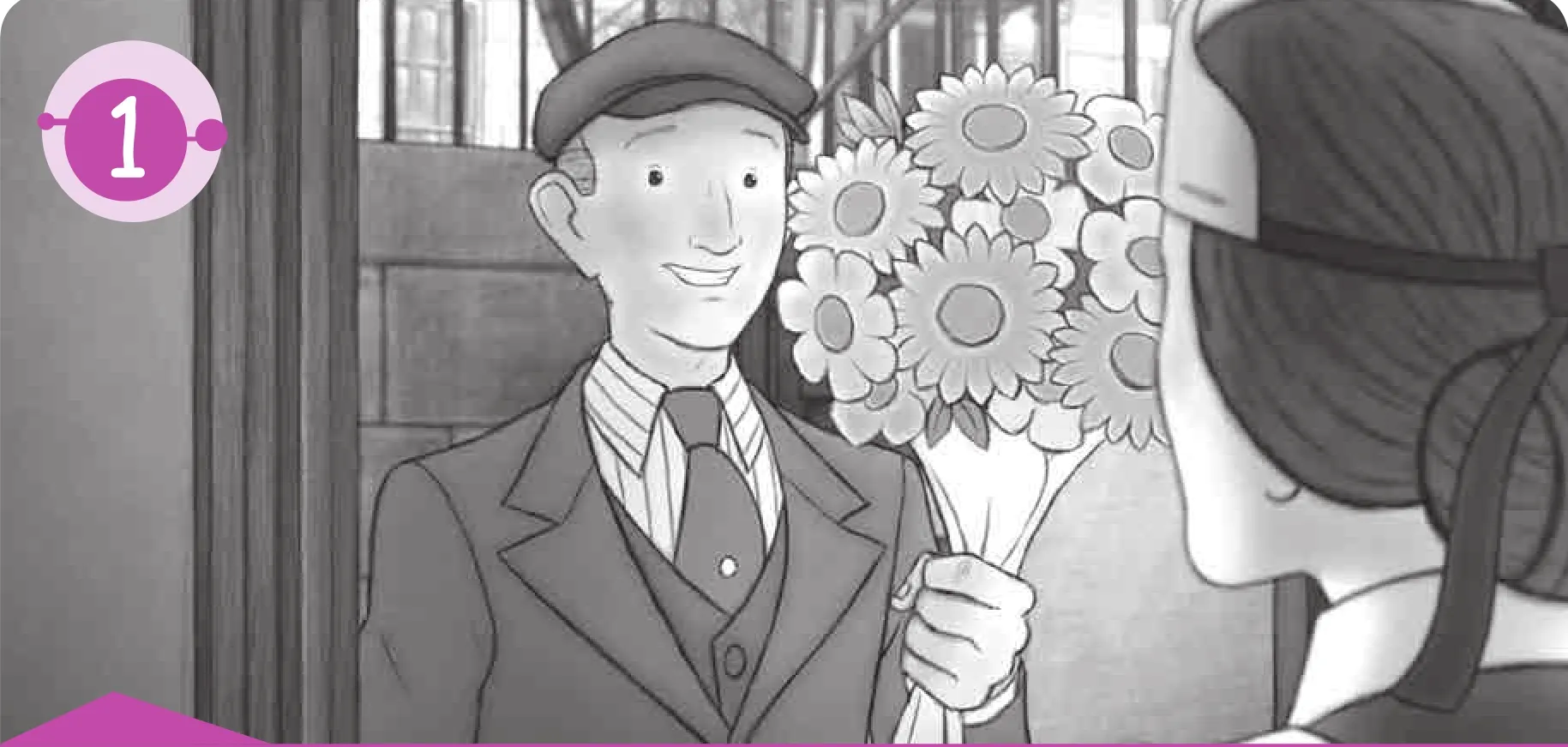
这部故事跨度几乎囊括整个20世纪的动画电影是一部非常典型的英国片——浓重的伦敦口音、各种英式口语俚语,以及很有英伦风情的表达用法,都与我们平时在教材里接触到的内容有一定区别,同学们在听声音的时候不妨多加留意。
欧内斯特每天骑车都会路过埃塞尔帮佣的人家,两人隔窗相望,渐生情愫。他们每天都会隔着楼上楼下的距离打声招呼,直到一场大雨打断了联系,于是欧内斯特决定上门追求……
Ethel: Yes, yes, I’m coming!1)Doh!
Ernest: Hello,2)duck.
Ethel: Oh! Oh, it’s you.
Ernest: Thought I’d introduce myself. You’ve waved that3)blooming4)duster at me enough times.
Ethel: Well, no, I didn’t mean to. It was just that…
Ernest: Name’s Ernest.
Ethel: Oh, oh, I’m Ethel.
Ernest: That’s a nice name. Well, Ethel, how about coming to the pictures with me?
Ethel: Oh, well, I…they’ve got lots for me to do.Ernest: What time you5)knock off?
Ethel: I finish at about seven.
Ernest: Perfect! They are showing Hangman’s House at the local.
Ethel: You mean, the6)Coronation?
Ernest: Yes. Starts at eight, I could meet you there.
Ethel: Thank you. That’s…that would be very nice.
Ernest:7)Grand. And these…they’re for you.(Ernest hands over a bundle of flowers to Ethel.)
Ethel: Oh, they are…lovely.
Ernest: See you about a quarter to, then.
Ethel: Yes. Yes, I’ll be there!
1) doh [dəʊ] interj. 哦,真烦
2) duck [dʌk] n. 亲爱的人,宝贝
3) blooming ['bluːmɪŋ] adj. & adv. 非常(的),讨厌(的),用以加强语气的口语用法。
4) duster ['dʌstə(r)] n. 抹布
5) knock off 休息,下班
6) coronation [kɒrə'neɪʃ(ə)n] n. 加冕
7) grand [grænd] adj. <口>完美的
词组:go to the pictures
我们刚开始接触英语就学了不少关于“看电影”的英文表达,比如go to the movies、go to the cinema、go to the theatre等。而在这个选段中,我们又学到了一个新的词组:go to the pictures。既然都是表示看电影,这几个词组有何区别呢?一般来说,go to the pictures和go to the cinema在英国用得比较多,美国则多用go to the movies;另外,go to the pictures可以说是相对过时的说法,哪怕在英国,通常只有年纪比较大的人会用这种说法。
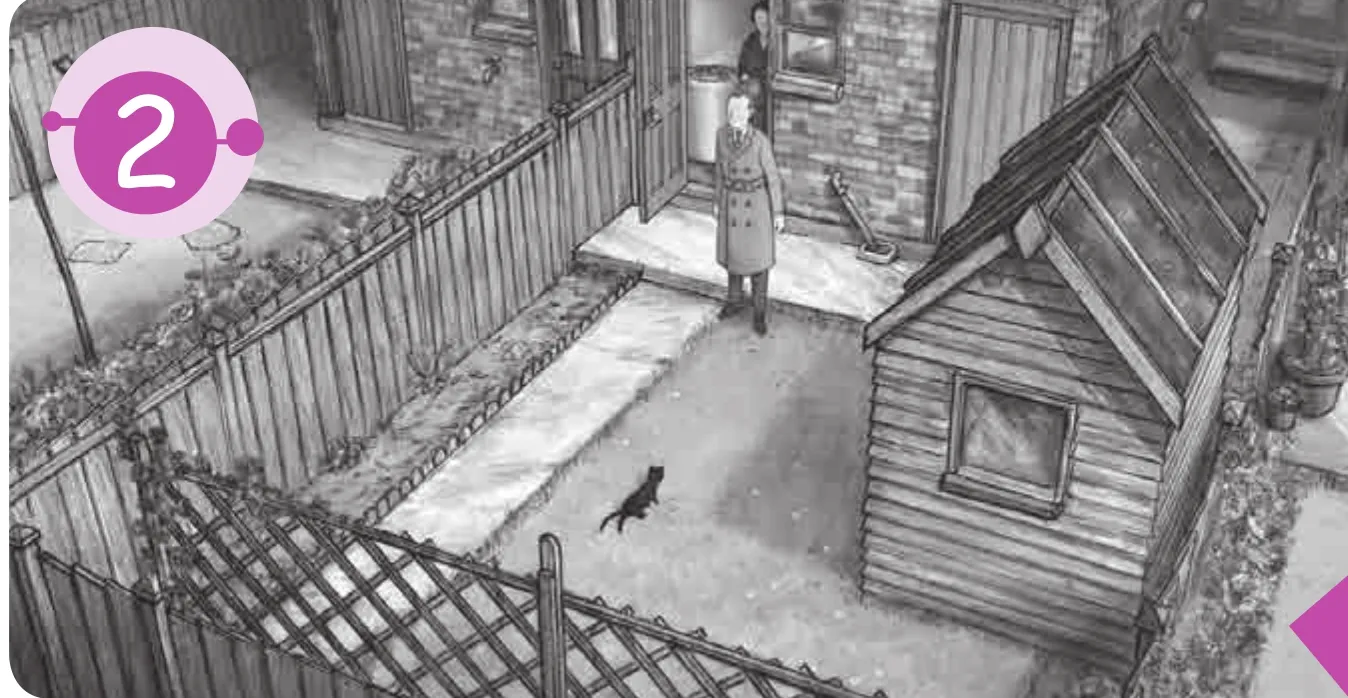
欧内斯特与埃塞尔迅速坠入爱河。不久之后,埃塞尔向女主人提出辞职,准备结婚……
The Lady: Am I to understand that you wish to leave us?
Ethel: Yes, madam.
The Lady: To get married?
Ethel: Yes, madam.
The Lady: To a man?!
Ethel: Yes, madam.
The Lady: Well, I hope you know what you’re doing.
Ethel: Ever so sorry, madam. (Ethel leaves the house.)
Ernest: Give us your box, darling.
Ethel: Oh, I don’t like leaving them. They’re so helpless. They can’t do a thing for themselves.
Ernest: Hm, serve them right.8)Bloated9)plutocrats!
Ethel: There’s no need to10)swear, Ernest.
Ernest: What? Don’t worry about them.
They’ll soon get another11)skivvy.
Ethel: I was not a skivvy! I was a12)lady’s
maid and what’s more, I’m gonna be married!
Ernest: So am I!
(The couple is checking their new house.)
Ethel: Oh, it’s lovely. But 825 pounds, can we afford that13)mortgage business?
Ernest: Yeah, it’s easy. I’ll be getting three14)guineas a week soon. Besides, we’ve got 25 years—1955, it’ll be ours. A15)wrought iron gate, your ladyship.
Ethel: You silly. Oh, and look, Ernest, a marble16)pillar.
Ernest: Look at this.
Ethel: Oh, Ernest. It’s so much space. We could get those electric lights put in.
Ernest: Yeah, nice and modern. Brother Fred’s got a17)wireless, he can hear Germany.
Ethel: Whatever would you want to hear Germany for? Oh! A French window! Oh,Ernest, there’s a bathroom!
Ernest:18)Blimey! The19)lav too.
Ethel: Come along, Ernest.
Ernest: Enormous bedroom! Four windows in one room!
Ethel: It’ll cost a fortune for curtains.
Ernest: A bit different to home, eh, darling? Lots of rooms for two people.
Ethel: Perhaps there’ll be more than two one day.Ernest: What?20)Lodgers you mean?
Ethel: No! This could be our baby’s room.
Ernest: Nice and warm over the kitchen.
Ethel: Let’s get rid of this old21)range.
Ernest: Ha! This22)boiler23)came out of the ark.(The two walk outside to the backyard, and a cat comes near.) Hello, puss.24)A fair bit of garden,more than25)down-home.
Ethel: Oh, I’ve always wanted my own bit of garden.
Ernest: A little26)shed for my bike and workshop.Ethel: And mind you, keep it tidy.
Ernest: Don’t you start27)bossing me about before we get married.
Ethel: Oh, Ernest, I can’t believe it.
Ernest: We’ll have a kitchen and a28)scullery.
Ethel: A sitting room and a dining room.
Ernest: A garden and a shed.
Ethel: Don’t forget the hall.
Ernest: And the bathroom! Luxury!
Ethel: Oh!

8) bloated ['bləʊtɪd] adj. 膨胀的,傲慢的
9) plutocrat ['pluːtəkræt] n. 富豪,财阀
10) swear [sweə(r)] v. 诅咒,咒骂
11) skivvy ['skɪvɪ] n. 干粗活的女仆
12) lady’s maid (尤指伺候贵妇人更衣化妆的)侍女
13) mortgage ['mɔːgɪdʒ] n. 抵押
14) guinea ['gɪnɪ] n. 几尼,一种英国旧金币,相当于21先令,即1.05英镑。
15) wrought [rɔːt] adj. 锻造的,精细的
16) pillar ['pɪlə(r)] n. 柱子
17) wireless ['waɪəlɪs] n. 无线电广播设备,收音机
18) blimey ['blaɪmɪ] interj. <英口>啊呀!天呐!下文的Cor blimey和Cor都可以表达同样的意思。
19) lav [læv] n. <英>抽水马桶,即lavatory
20) lodger ['lɒdʒə(r)] n. 房客,寄宿人
21) range [reɪndʒ] n. 火炉,炉灶
22) boiler ['bɔɪlə(r)] n. 锅炉,煮器
23) come out of the ark <口>十分陈旧的,过时的
24) a fair bit of 大量的
25) down-home ['daʊn'həʊm] adj. 乡下的,淳朴的
26) shed [ʃed] n. 小屋,棚
27) boss about 把(某人)指使得团团转
28) scullery ['skʌlərɪ] n. 餐具存放室,碗碟洗涤室
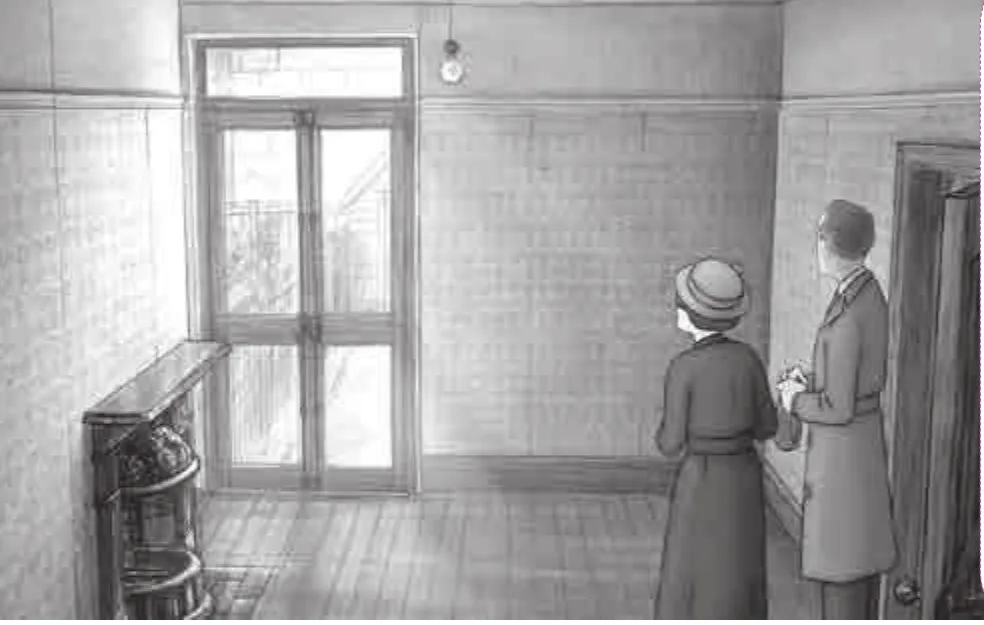
Am I to understand that you wish to leave us?
假如别人的发言让你产生了疑问,你可以用“Am I to understand that…?”这个句型进行确认。虽然这是一个礼貌用语,但是在具体语境中,根据发问人的语气和口吻的不同,可以表达出比单纯的礼貌更复杂的意思,比如此处女主人流露出来的傲慢态度。此外,“be + to do”这种结构通常用于第一人称疑问句中,表示征求对方意见,如:Am I to stop here or what? (我是要在这儿停下吗,还是怎样来着?)
Am I to understand that you wish to leave us?
两人在婚后一点点地将房子布置成家的模样,而他们盼望已久的小生命即将到来……
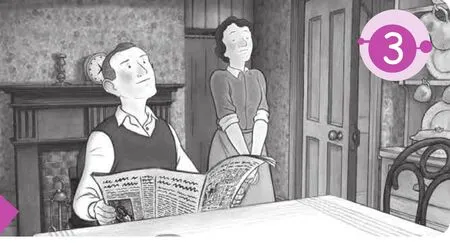
Ethel: I’ve made a curtain for under the tank.It’ll hide the pipes.
Ernest: I’ll keep my outdoor clothes there.The pipes will dry them off.
Ethel: Oh, but your coats smell of29)stale milk, Ernest.
Ernest: Yeah, sorry.
Ethel: Do you think you’ll ever be promoted?Ernest: I blooming fear. Not me.30)Yard31)foreman, stuck in a tin shed all day,adding up rows of figures?32)Blow that for a lark, I like the fresh air!
Ethel: I could have married…a deep-sea
diver.
Ernest: Well, why didn’t you?
Ethel: Because…I didn’t love him.
(Another day)
Ernest: Ette! Surprise, dear.
Ethel: Oh.
Ernest: New mirror!
Ethel: It’s lovely. How ever did you get it home?
Ernest: I walked it back on my bike pedal.
Ethel: How much was it?
Ernest: Only half a dollar. I got it off of a
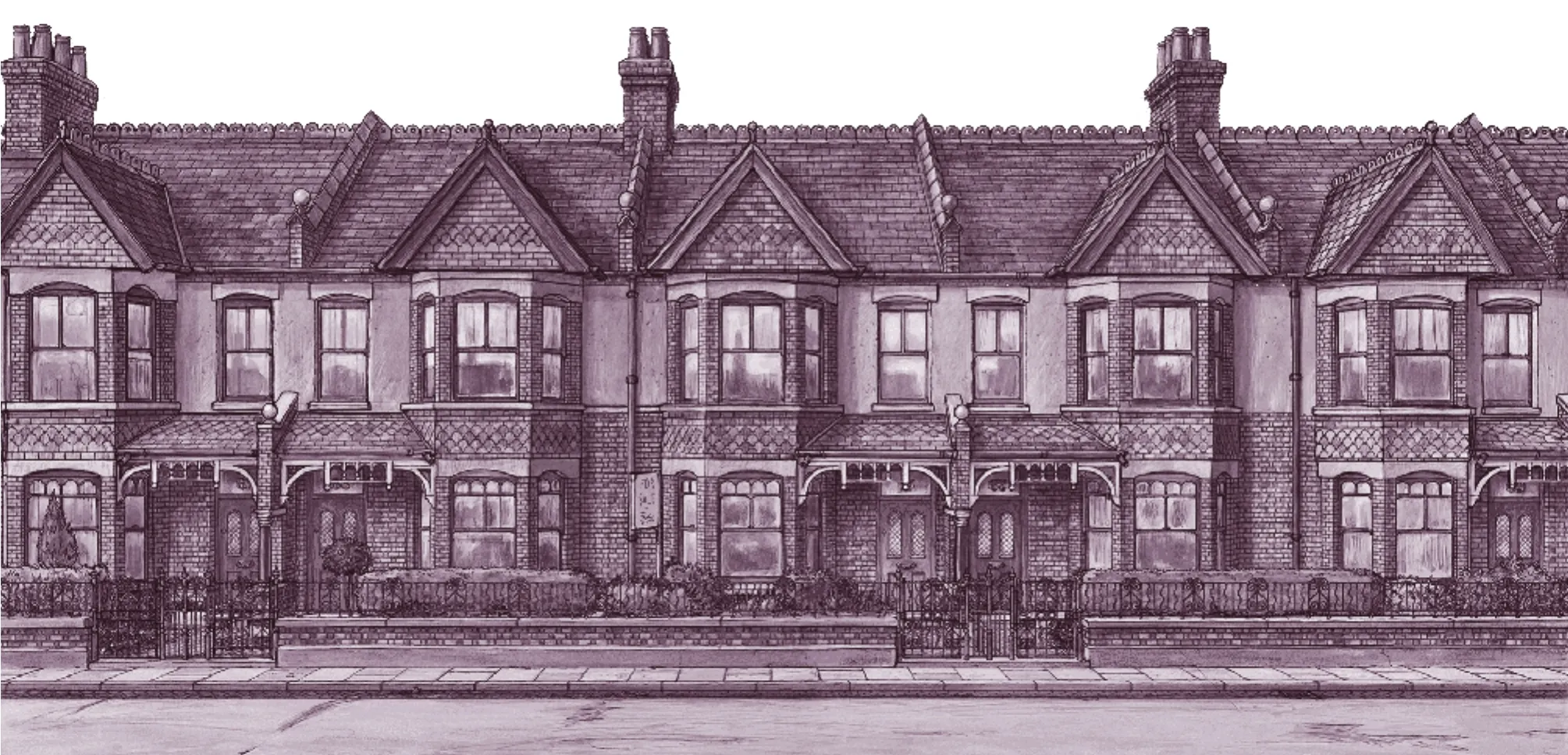
33)didicoy down-home.
Ethel: I’ve got a surprise for you too.
Ernest: Oh, yes?
Ethel: I’ve been to…the doctor.
Ernest: Oh. And? You mean?We’re…? We’re going to…?34)Yippee!
Ethel: I can’t believe it!
Ernest: Oh, Ette!
I could have married…a deep-sea diver.
Could have done有两种用法,一种是用在虚拟语气中,表示原本能够做某事但没做,意思是“本可以”;另一种则表示对已经发生的动作或已经存在的状态的主观猜测,意思是“过去可能(已经)”,如:
● I could have joined the army, if my mom had let me. (如果我妈允许的话,我本来可以参军的。——虚拟语气)
● Jim could have taken the book—he was here alone yesterday. (可能是吉姆拿了书,昨天就他一个人待在这儿。——表猜测)
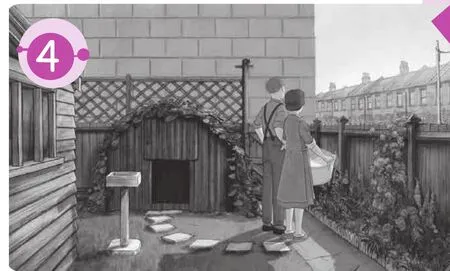
战争的阴影步步迫近,夫妻俩把儿子雷蒙德送到乡下避难,自己则留在伦敦守卫家园。欧内斯特开始建防空洞……
Ethel: Mind my35)antirrhinums, Ernest. I hope you know what you’re doing.
Ernest: Eh? Of course, duck. You just wait. That’s it, all done.Ethel: Is that it? Finished? Is it really36)bombproof?
Ernest: You’ll have to wait and see.
(At night)
Ernest: Russia’s invaded Finland now.
Ethel: I thought they’d invaded Poland.
Ernest: Yes, they have.
Ethel: But you said Germany’s invaded Poland.
Ernest: Yes, that’s right.
Ethel: Who was it invaded Czechoslovakia?
Ernest: Germany.
Ethel: Oh, Germany’s always invading someone. I expect they’ll invade Russia one day.
Ernest: Cor blimey! Not likely. They’re in league.注
29) stale [steɪl] adj. 不新鲜的,旧的
30) yard [jɑːd] n. 工场,工厂
31) foreman ['fɔːmən] n. 工头,领班
32) blow that for a lark <英俚>算了吧,放过我吧
33) didicoy ['dɪdɪkɔɪ] n. <英俚>流动白铁工,流动废铁商,又作didicoi。
34) yippee ['jɪpiː] interj. 啊呀!(欢呼声)
35) antirrhinum [,æntɪ'raɪnəm] n. 金鱼草
36) bombproof ['bɒmpruːf] adj. 防弹的
注:此时二战刚刚打响,英国还没被波及,因此两人并不怎么了解二战阵营的具体划分。
Ethel: Or Russia will invade Germany.
Ernest: Oh, don’t be37)daft.
Ethel: Well, if they all keep invading one another, we’ll end up invading someone.
Ernest: Oh, Ette, you just don’t understand politics. (Their candle accidentally falls into the water and the whole shelter falls into darkness.)
Ethel: Doh! Now look. Blessed shelter!
(Ernest joins the fire service during wartime.One day, he comes home exhaustedly.)
Ethel: Oh, at last. Are you all right?
Ernest: Tired. Been in the38)docks, 14 hours.
Ethel: Here. Let me get your boots off. There.
Ernest: Loads of dead, little39)kiddie, all in bits. I had to…
Ethel: There, there. Have a good cry.
(The other day, Ethel comes home happily.)
Ethel: You there?
Ernest: What’s up, Ette?
Ethel: Dearest, I’ve been promoted. Clerk,grade B3.
Ernest: Cor! No more packing parcels in that40)rotten freezing41)warehouse?
Ethel: No, I’m going to work in an office.
Ernest: And that’s not all, Ette. Look, a letter from our boy. They42)reckon he can come home now.
Ethel: Oh! Oh, Ernest!
(There’re bombs exploding at night everywhere.)
Ernest:43)Crikey, dear, sounds like a lot got through tonight.
Ethel: I can’t hear anything.
Ernest: Hold tight, duck.
(A bomb explodes near their house. The next morning, Ethel finds that the sitting room is in a mess.)
Ethel: Some shelter. Full of glass.44)Morrison
Shelters. That Mr. Morrison must be a45)proper46)twerp.
Ernest:47)Good job the boy wasn’t in it.
Ethel: The old48)Dorothy Perkins is still in bloom. She survived.
Ernest: Pity he didn’t take his teddy with him. (The teddy bear is damaged by the shattered glass.)
Ethel: Oh, Ernest. How much more of this is there gonna be?
(The war finally ends. The whole neighbourhood is celebrating on the street.)
Ethel: Ernest?
Ernest: What?
Ethel: Careful, that’s your second glass of beer.
Ernest: Victory in Europe, Ette!
The Neighbours: Yeah!
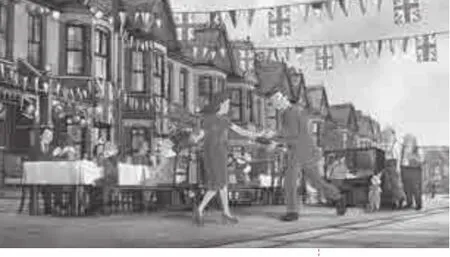
Some的用法小结
我们最早接触到的some是一个不定限定词,意为“一些”,后面一般跟复数名词。后来我们又遇到了some的新用法,指“未知或未确指的人﹑地点或事物”,后面跟可数名词单数。而本选段中的some则是第三种用法,表达的是说话人对某人或某物的褒贬,如:
● Roger brought some books here.
(罗杰带了一些书来。)
● Some man at the door is asking to
see you. (门口有个人要见你。)
● A friend of mine sold me an iPad that doesn’t work. —Some friend!(一个朋友卖给我一部iPad,居然是坏的。——什么鬼朋友啊!)
37) daft [dɑːft] adj. 愚笨的,头脑简单的
38) dock [dɒk] n. 码头,船坞
39) kiddie ['kɪdɪ] n. 小孩,亦作kiddy
40) rotten ['rɒt(ə)n] adv. <口>非常,极
41) warehouse ['weəhaʊs] n. 仓库
42) reckon ['rekən] v. 估计,认为
43) crikey ['kraɪkɪ] interj. 哎呀!(表惊讶)
44) Morrison Shelter 莫里森防空室,又称为桌形室内防空室(Table Indoor Shelter),由剑桥大学教授约翰·贝克设计,命名来自当时的英国内政大臣赫伯特·莫里森(Herbert Morrison)。
45) proper ['prɒpə(r)] adj. <口>完完全全的,彻底的(修饰含有贬义的名词)
46) twerp [twзːp] n. 蠢人,讨厌鬼
47) good job 幸好,幸亏
48) Dorothy Perkins 道潘金,蔓生月季的一种。
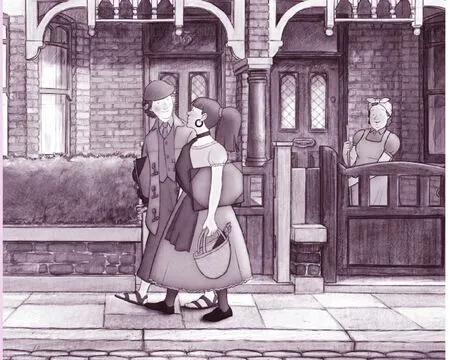
1
埃塞尔:哎,是,来啦!真烦!
欧内斯特:你好,宝贝。
埃塞尔:噢!喔,是你呀。
欧内斯特:我觉得应该来自我介绍一下,毕竟你朝我挥了那么多次抹布呢。
埃塞尔:哦,不,我不是故意的,只不过……
欧内斯特:我的名字是欧内斯特。
埃塞尔:噢,哦,我叫埃塞尔。
欧内斯特:真是个好名字。对了,埃塞尔,跟我去看场电影怎么样?
埃塞尔:哦,这个,我……还有很多活儿要干。
欧内斯特:你什么时候下班?
埃塞尔:大概7点吧。
欧内斯特:太好了!他们正在这边放映《刽子手之家》呢。
埃塞尔:你是说在加冕影院吗?
欧内斯特:没错。电影8点开场,我们可以在那儿碰头。埃塞尔:好啊。那……那太好了。
欧内斯特:很好。还有,这是送给你的。(欧内斯特递给埃塞尔一束花。)
埃塞尔:噢,它们……真漂亮。
欧内斯特:那我们7点45分见咯。
埃塞尔:行啊。好,我会去的!
2
女主人:我能理解为你想离开我们吗?
埃塞尔:是的,夫人。
女主人:去结婚?
埃塞尔:是的,夫人。
女主人:跟一个男人?!
埃塞尔:是的,夫人。
女主人:好吧,我希望你知道自己在做什么。
埃塞尔:非常抱歉,夫人。(埃塞尔从房子里出来。)
欧内斯特:把箱子给我吧,亲爱的。
埃塞尔:噢,我不想离开她们,她们是如此无助,根本
不能自力更生。
欧内斯特:哼,活该,这些傲慢的有钱佬!
埃塞尔:没必要骂骂咧咧的,欧内斯特。
欧内斯特:啥?别操心了,她们很快会找到新女仆的。埃塞尔:我才不是女仆!我是个侍女,再说了,我快结婚了!
欧内斯特:我也是!
(两人参观新居。)
埃塞尔:哇,真漂亮。但是825英镑啊,我们负担得起房贷吗?
欧内斯特:当然,这有多难。很快我就能每周挣上3几尼了。再说,我们只要供25年,到了1955年,这房子就是我们的了。这是一扇锻铁门,夫人。
埃塞尔:傻瓜。噢,看,欧内斯特,一根大理石柱子。
欧内斯特:看这里。
埃塞尔:噢,欧内斯特,这地方好大啊。我们可以装上一些电灯。
欧内斯特:是啊,漂亮又现代。弗雷德哥哥有无线电,可以听德国电台。
埃塞尔:你想从德国电台听些什么?哇,一扇法式落地窗!噢,欧内斯特,这儿有个浴室!
欧内斯特:啊呀!还有抽水马桶。
埃塞尔:快跟上,欧内斯特。
欧内斯特:超大的卧室!一个房间有四扇窗!
埃塞尔:买窗帘可要花一大笔钱了。
欧内斯特:跟想象中的家有点不一样,是吧,亲爱的?两个人住这么多房间。
埃塞尔:将来或许不止两个人呢。
欧内斯特:什么?你是指房客吗?
埃塞尔:不是!我们的孩子可以
睡这间房。
欧内斯特:刚好在厨房的楼上,温暖舒适。
埃塞尔:我们把这个旧炉灶
扔了吧。
欧内斯特:哈!这锅炉也太过时了。(两人走到室外的后院,一只小猫凑了过来。)你好呀,小猫。好大的花园,比乡下的还大。
埃塞尔:噢,我一直想要一个属于自己的花园。
欧内斯特:这有个小屋,我可以放自行车,当工作间用。
埃塞尔:注意保持整洁啊。
欧内斯特:我们还没结婚呢,你就开始对我发号施令啦。
埃塞尔:哦,欧内斯特,我简直不敢相信这一切。
欧内斯特:我们会有一个厨房、一个碗碟洗涤室。
埃塞尔:一个客厅、一个饭厅。
欧内斯特:一个花园、一间棚屋。
埃塞尔:别忘了还有门厅。
欧内斯特:还有浴室!简直奢华!
埃塞尔:噢!
3
埃塞尔:我给水箱做了个帘子,这样就能遮住水管了。
欧内斯特:我可以把户外服挂在那儿,让水管烘干它们。
埃塞尔:但你的外套有股馊牛奶味啊,欧内斯特。
欧内斯特:啊,真抱歉。
埃塞尔:你觉得你会升职吗?
欧内斯特:恐怕不行,我可不干。工场领班,整天困在锡棚里,对着一行行数字加加减减?饶了我吧,我喜欢新鲜空气!
埃塞尔:我本来可以嫁给……一个深海潜水员。
欧内斯特:哦,那你为什么不嫁呢?
埃塞尔:因为……我不爱他呀。
(另一天)
欧内斯特:埃特!一个惊喜,亲爱的。
埃塞尔:噢。
欧内斯特:新镜子!
埃塞尔:真漂亮。你怎么把它带回家的?
欧内斯特:我把它放在自行车的脚踏上推回来。埃塞尔:多少钱?
欧内斯特:只花了半美元。我从一个老实的白铁工手里买来的。
埃塞尔:我也为你准备了一个惊喜。欧内斯特:噢,是吗?
埃塞尔:我已经……看过医生了。
欧内斯特:噢,然后呢?你是说?我们……?我们将要……?噢耶!
埃塞尔:我简直不敢相信!
欧内斯特:哦,埃特!
4
埃塞尔:小心我的金鱼草,欧内斯特,希望你知道自己在做什么。
欧内斯特:啊?当然了,宝贝,你就等着吧。好了,完工啦。
埃塞尔:就这样?完工了?这真的能防弹么?
欧内斯特:你等着瞧吧。
(晚上)
欧内斯特:俄国现在入侵芬兰了。
埃塞尔:我以为他们入侵的是波兰。
欧内斯特:对,他们是入侵了波兰。
埃塞尔:但你之前说是德国入侵的波兰啊。
欧内斯特:是,没错啊。
埃塞尔:那谁入侵的捷克斯洛伐克?
欧内斯特:德国。
埃塞尔:噢,德国老在侵略别人,我希望他们有一天能去侵略俄国。
欧内斯特:老天爷!这不太可能,他们是一伙的。
埃塞尔:或者俄国去入侵德国。
欧内斯特:噢,别犯傻了。
埃塞尔:好吧,如果他们总是侵略其他国家,我们最终也会侵略别人的。
欧内斯特:噢,埃特,你根本不懂政治。(蜡烛意外掉到水里,防空洞陷入一片黑暗。)
埃塞尔:嘿!看吧,见鬼的防空洞!
(欧内斯特在战时加入消防队。一天,他筋疲力尽地回到家。)
埃塞尔:噢,你总算回来了。你还好吗?
欧内斯特:累啊。一直在码头待着,有14个小时了。
埃塞尔:来,让我帮你把靴子脱了。好啦。
欧内斯特:成堆的尸体,全是小孩子,都支离破碎的。我不得不……
埃塞尔:好了,好了。痛快地哭一场吧。
(另一天,埃塞尔开心地回到家。)
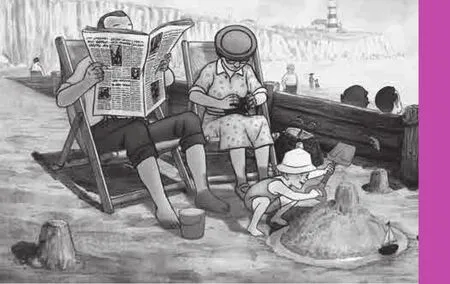
埃塞尔:在家吗?
欧内斯特:怎么了,埃特?
埃塞尔:亲爱的,我升职了,B3级文员。
欧内斯特:天啊!再也不用在那个无比阴冷的仓库里打包啦?
埃塞尔:对,我要在办公室上班啦。
欧内斯特:那可真是双喜临门,埃特,看,我们儿子寄来的信。他们认为他现在可以回家了。
埃塞尔:噢!哦,欧内斯特!
(夜里到处都是爆炸声。)
欧内斯特:哎哟,亲爱的,今晚听起来可够呛。
埃塞尔:我什么都听不到。
欧内斯特:抱紧我,宝贝。
(一个炸弹在屋子附近爆炸。第二天早上,埃塞尔发现客厅一片狼藉。)
埃塞尔:什么防空室,到处都是碎玻璃。莫里森防空室——那位莫里森先生一定是个大蠢蛋。
欧内斯特:幸好儿子不在里面。
埃塞尔:道潘金月季还好好地开着花呢。它熬过来了。
欧内斯特:可惜儿子没把他的泰迪熊带走。(泰迪熊身上扎满碎玻璃。)
埃塞尔:哦,欧内斯特,这种日子什么时候才是个头啊?
(战争终于结束。整个街区都在庆祝。)
埃塞尔:欧内斯特?
欧内斯特:什么?
埃塞尔:悠着点,那是你的第二杯啤酒了。
欧内斯特:欧洲胜利了,埃特!
众邻居:没错!
